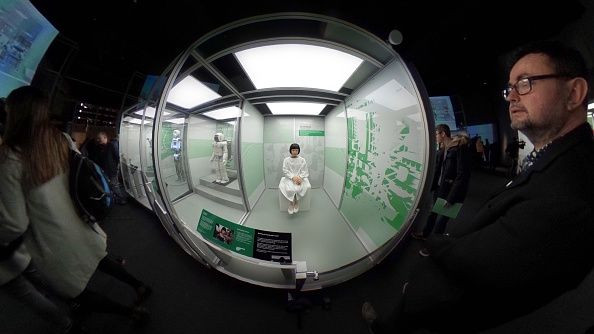Humans Brains Could Be Connected To Computers If Elon Musk's Neuralink Is Approved

Connecting the human brain to computers is quickly becoming one of the hottest ideas in Silicon Valley, with Tesla's Elon Musk and Facebook's Mark Zuckerberg among the many top tech entrepreneurs leading the charge.
In March, Musk launched Neuralink, a medical research company that creates brain-computer interfaces (BCIs). Musk has previously expressed the importance of upgrading human cognition in order to ensure people are not made obsolete by artificial intelligence. BCIs would initially be used for medical research, with the ultimate goal being to blur the lines between people and artificial intelligence.
Neuralink has been registered as a medical research company, and Musk said they will produce a product to help people with severe brain injuries within four years, the Washington Post reports.
These planned medical breakthroughs will be the base for developing BCIs for healthy people, eventually allowing them to communicate by using “consensual telepathy.” Musk has stated he believes these breakthroughs can occur within five years. However, some scientists, especially neuroscientists, are skeptical of his ambitious timeline.
A few weeks after Musk announced Neuralink, Facebook said it was developing a way for people to “type” by thought. The company hopes to develop a device that would allow people to type up to 100 words per minute, according to Regina Dugan, head of Facebook’s Building 8 research group. Dugan has also said the device might be able to work as a brain mouse for augmented reality.
Last year the U.S. military’s Defense Advanced Research Projects Agency (DARPA) announced a $60 million program to develop an implantable neural interface. The project is part of former President Barack Obama’s BRAIN Initiative. DARPA’s goal is to develop a device that can record 1 million neurons simultaneously and stimulate at least 100,000 in the brain. The project is also ambitious because DARPA wants the device to be wireless, the size of a nickel and read in four years. One potential way the device could be utilized is in compensating for sight or hearing problems as the device would be able to send digital auditory or visual information to the brain.

Meanwhile, Bryan Johnson, founder of the online payments company Braintree, invested $100 million in a startup called Kernel. The company is currently focusing on technology similar to Neuralink. They plan to build a flexible platform that records and stimulates neurons in order to treat diseases such as depression and Alzheimer’s.
Read: Typing With Your Thoughts, Hearing With Your Skin? Neuroscientist Weighs In On Facebook F8 Ideas
“There’s this potential to co-evolve with our technology,” Johnson said to CNBC in April.
© Copyright IBTimes 2024. All rights reserved.




















